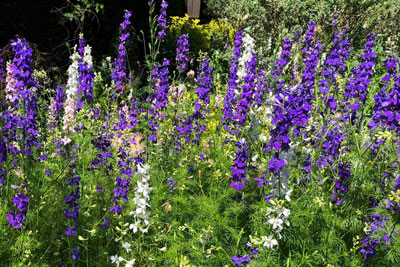Gotta Love Larkspurs!
“Annual” flowers complete their life cycles in the garden within one growing season and then they’re gone. “Perennial” flowers come back year after year from their roots.

With larkspurs you really get the best of both worlds. Truth is, they’re annuals that germinate in the fall, establish over the winter and bloom in mid-spring (April in South Texas and May in North Texas). But they self-sow their own seeds so they can start the whole process over again as long as we don’t come in and rototill to mess up the cycle.
Simple things you’ll want to know about larkspurs…
• You’ll see larkspurs listed in seed catalogs as “Delphiniums,” but these are Consolida ambigua. They are much more dependable in Texas than the big hybrid delphiniums. Rather than trying to buy seeds online or from packets, I’d really suggest just asking for a start from someone down the street who is already growing them.
• Plant your seeds among perennials that will remain undisturbed for many years, or give them their own dedicated little corner of the perennial garden.
• They do best with full morning sun and a little bit of shade in mid-afternoon.
• Mature height: 15-24 inches, at least in the old gardens I see. Probably in a well-cultivated setting with rich garden soil they could grow up to 30 inches tall.
• Purple-blue is the predominant color, but whites are common and pinks even show up. My wife was on her phone texting a friend when I got back in the car after taking this week’s lead photo. I uttered, “It’s easy to see what the recessive gene color is with this plant, isn’t it.” “Uh huh,” she replied. Then she went back to texting.
So your take-away from today’s Plant of the Week: Find yourself a new friend with a yard filled with larkspur, figure a good trade, and come home with a packet of seed sometime this summer. Keep it in the fridge until mid-fall, then scratch up a spot where you’d like to love you some larkspurs next spring.
